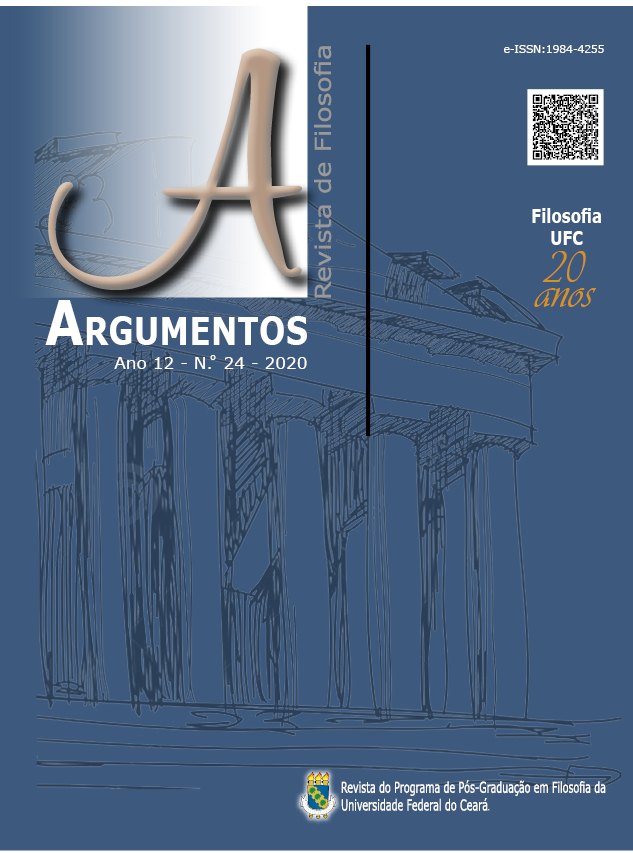Right to be wrong: excuses and epistemic innocence
DOI:
https://doi.org/10.36517/Argumentos.24.9Keywords:
Epistemic excuses. Innocence. Pragmatism. Attributions of knowledge.Abstract
If a subject S attributes knowledge ignoring available evidence, then S will not be guilty of such attribution and, therefore, will not be epistemically irresponsible, when: (a) he is not aware of his own ignorance and (b) those who judge him, explicitly or implicitly, they put themselves in his place and acknowledge that they would not be aware of his ignorance. In this paper the application of such a principle will be defended, not only with regard to the attributions of knowledge in ordinary contexts, but also with regard to the most demanding contexts.
References
Blome-Tillmann, M. (2013). Knowledge and implicatures. Synthese, 190(18), 4293-4319.
BonJour, L. (2010). The myth of knowledge. Philosophical Perspectives, 24(1), 57-83.
Conee, E., & Feldman, R. (2004). Evidentialism: Essays in Epistemology. Oxford: Clarendon Press.
Davidson, D. (1980). Essays on Actions and Events. Oxford: Clarendon Press.
Feldman, R. (1981). Fallibilism and Knowing That One Knows. The Philosophical Review, 90, 266-82.
Goldman, A. (1976). Discrimination and perceptual knowledge. Journal of Philosophy, 73, 771-791.
Goldman, A. (1986). Epistemology and Cognition. Cambridge: Harvard University Press.
Grice, P. (1975). Logic and Conversation. In e. b. Morgan, Syntax and Semantics, Vol. 3, Speech Acts (pp. 41-58). New York: Acedemic Press.
Hawthorne, J. (2004). Knowledge and Lotteries. Oxford: Clarendon Press.
Hazlett, & Allan. (2010). The myth of factive verbs. Philosophy and Phenomenological Research, 80(3), 497-522.
Heathwood, C. (2009). Moral and Epistemic Open Question Arguments. Philosophical Books, 50, 83-98.
Hetherington, S. (2013). Concessive knowledge-attributions: fallibilism and gradualism. Synthese, 190(14), 2835-2851.
Kvanvig, J. (2011). Against Pragmatic Encroachment. Logos & Episteme, 2(1), 77-85.
Lewis, D. (1996). Elusive Knowledge. Australasian Journal of Philosophy, 74(4), 549-567.
Loader, P. (2012). The epistemic/pragmatic dichotomy. Philosophical Explorations, 15(2), 219-232.
Pedace, K. (2017). Mente y Lenguaje. Buenos Aires: SADAF.
Schaffer, J. (2004). From Contextualism to Contrastivism. Philosophical Studies, 119(1), 73-104.
Schaffer, J. (2012). Contrastive Knowledge Surveyed. Nous, 46(4), 675–708.
Stanley, J. (2005). Knowledge And Practical Interests. Oxford: Oxfiord University Press.
Sullivan-Bissett, E. (2015). Implicit bias, confabulation, and epistemic innocence. Consciousness and Cognition, 33, 548-560.
Vavova, K. (2018). Irrelevant influences. Philosophy and Phenomenological Research, 96(1), 134-152.
Downloads
Published
Issue
Section
License
Argumentos magazine is licensed under an International Creative Commons Attribution License.
The Magazine uses CC BY inclusion
1) The authors retain the copyright granted to the magazine or the right to initial publication, with the work regularly licensed under the Creative Commons Attribution, which allows the sharing of the work with acknowledgment of authorship and initial publication in this magazine.
2) The authors are authorized to contract additional applicable contracts, for non-exclusive distribution of the version of the work published in this journal (for example, publication in the institutional repository or as a chapter of the book), recognition of authorship and initial publication in this journal.
3) Authors are authorized and encourage to publish and distribute their work online (for example, in institutional repositories or on their personal pages) at any time before or during the editorial process, as they can generate productive changes, as well as increase the impact and reference of published work.




.jpg)










._._3.png)
1.jpg)
._._._.png)
